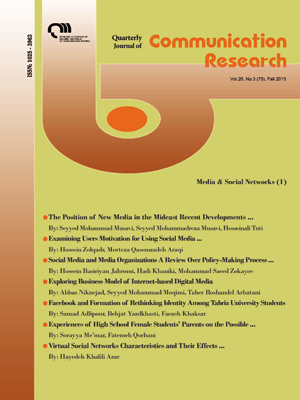افتاده، جواد. (1389). رسانههای اجتماعی و کتاب بازگشت عموم و باز نشر کتاب. فصلنامه کتاب مهر، 1.
تانکارد، جیمز و سورین، ورنر. (1384). نظریههای ارتباطات(ترجمه علیرضا دهقان). تهران: انتشارات دانشگاه تهران.
ترلو، کریسپین و همکاران. (1389). ارتباطات کامپیوترـ واسط (ترجمه سروناز تربتی). نشر: جامعهشناسان.
ذوالقدر، حسین و قاسمزاده عراقی، مرتضی. (1391).رسانههای اجتماعی و نقش آن در کسب و کار. تهران: همایش روز رسانههای اجتماعی.
شاهقاسمی، احسان. (1385). مروری بر زمینههای تأثیر فضای مجازی بر نظریههای ارتباطات. مجله جهانی رسانه، 2.
عاملی، سعیدرضا. (1388). پژوهش مجازی. تهران: انتشارات پژوهشکده مطالعات فرهنگی و اجتماعی.
عاملی، سعیدرضا. (1389). مطالعات انتقادی استعمار مجازی امریکا. تهران: امیرکبیر.
لیتل جان، استیفن. (1384). نظریههای ارتباطات(ترجمه مرتضی نوربخش و سیداکبر میرحسینی). تهران: جنگل.
مک کوئیل، دنیس. (1385). درآمدی بر نظریه ارتباطات جمعی(ترجمه پرویز اجلالی). تهران: مرکز مطالعات و تحقیقات رسانهها.
Angleman, S. (2000). Uses and Gratifications and Internet Profiles: A Factor Analysis. Is Internet Use and Travel to Cyberspace Reinforced by Unrealized Gratifications? Paper presented at the Western Science Social Association 2001 Conference held in Reno, NV. From:
http://www.jrily.com/LiteraryIllusions/InternetGratificationStudyIndex.htm
Bennet, J.; Owers, M. & Tuker, M. (2010). Workplace of Social Networking. property Management. Vol. 28, No. 3, pp. 138.
Eteokleous, N. (2012). Facebook- Asocial Networking Toll for Educational Purposes Develophing Specal Interest Groups. ICICTE 2012 Proceedings. From:
http://www.pewinternet.org/Reports/2011/Why-Americans-Use-Social-Media/Main-report.aspx
Joinson, A. (2008). Looking at, Looking up or Keeping up with’ people? Motives and uses of Facebook. CHI 2008 Proceedings-Online Social Networks. Florence, Italy.
Kaplan, A. & Haenlein, M. (2010). Users of the World, Unite! The Challenges and Opportunities of Social Media. Business Horizons.
Newberry. (2001). Raising Student Social Presence In Online Classes. Web Net 2001 Proceedings (In Press).
Smith, A. (2011). Why Americans Use Social Media. From:
http://www.money.cnn.com/2012/10/04/technology/facebook-billion-users/index.html
Smith, A. (2012). Laurie Segall and Stacy Cowley.

